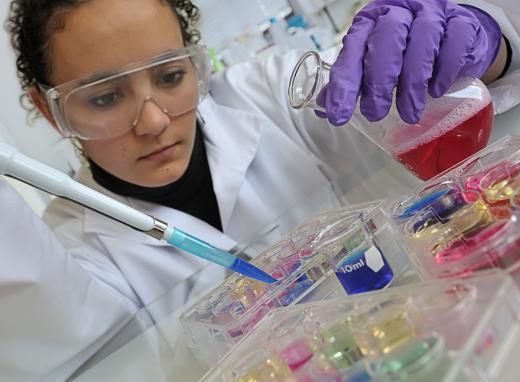What is Protein Biochemistry?
 Mary McMahon
Mary McMahon
Protein biochemistry is a scientific field dedicated to the study of proteins, complex chains of amino acids which make up the building blocks of all living organisms. Proteins are responsible for everything from the physical structure of an organism to the activities of the nervous system, making them of critical interest to people working in the biosciences. Colleges and universities may offer protein biochemistry as a part of their biochemistry programs for students interested in this topic, and people can also study protein biochemistry in private laboratories, government agencies, and the labs of charitable organizations.
Biochemistry itself is concerned with the complex chemistry of living organisms, including the chemical structure of the components of living organisms, the chemical interactions which occur in the body, and the errors in chemistry which contribute to disease and disability. In protein biochemistry, biochemists specially study proteins. These complex polymers yield a great deal of study material, as a single protein can occupy a researcher for life, and the body contains a myriad of proteins.

The study of protein biochemistry involves the study of the chemical structure of proteins, looking at the individual amino acids and how they link together, and the physical structure of proteins. Proteins are three dimensional in nature, and their shape can dictate their function. Changes in the shape of a protein can change the way it works, contribute to the development of new proteins, and contribute to the emergence of malignancies.

Researchers are also interested in the chemical reactions which involve proteins. These reactions are usually mediated by enzymes, which are also a topic of interest in protein biochemistry. Researchers can study protein expression, looking at the ways in which proteins express themselves and dictate various activities within the body, along with the ways in which proteins can be used. For example, the isolation of a specific protein on a medical test can be used to check for signs of disease in a patient.

People who work in the field of protein biochemistry generally have advanced degrees which may include postgraduate work. They can study proteins in humans or other organisms, and their pay can vary, depending on the type of research they do and the labs that they work in. Knowledge of protein chemistry can also be important for people working in other branches of biochemistry and in the life sciences in general, and protein biochemists may be part of scientific teams working on topics of medical or scientific interest.
AS FEATURED ON:
AS FEATURED ON:













Discussion Comments
Thanks for posting this message. I am working in a protein biochemistry lab, and in my two year work I found out that the soya bean contains amino acids and prevent many post menopause complications. After that I found out that it induces the appoptosis in uterus cells. -- v.athithan
As a full time researcher, I have always wondered why having a PhD was a requirement for getting a job as a research scientist. I definitely feel that the time spent in labs as an undergraduate student trains you on how to conduct yourself in a professional lab.
The only reason I can see why professional labs require a PhD from their employees is because having one shows that you have fully completed some sort of long term research project. Longevity and dedication is the key when it comes to working full time in a lab.
Other than that, I think professional labs should consider hiring people with undergraduate degrees alone. They at least have enough experience to be a lab assistant, depending on the education they received. Having a young, fresh set of eyes in the labs could give a new perspective to the research project.
I have spent years working in various labs as a protein biochemist. Thanks for writing this article. You do a good job on explaining the field, a lot better than most biochemists could.
I specialized in working with the proteins active in female reproductive organs. The companies I worked for made birth control pills, as well as pain killers for menstrual cramps. It was exciting work, at first. Some of my findings were pretty interesting.
I have always been a social person, so I am not sure how I worked so long in isolated labs. The only people I would see on a day to day basis were the two or three other scientist that I was working with.
I decided to start teaching, and I was able to land a job at a community college. I really enjoy being able to help train the next generation of scientists.
It is a good thing that I was able to find a teaching position, otherwise all the time and money I spent getting a PhD might have been a waste!
Thanks for posting this article. My roommate in college majored in biochemistry. She told me that she focused her studies on working with proteins, but I did not really know what she meant by that. Reading this article has made it all make sense.
I remember her spending hours on end in the lab. Often times, she would stay there overnight, working on or studying a particular protein.
Watching her dedicating her time made me appreciate those who work in research. It takes a lot of patience to work in a lab, and you risk not getting the results that you want, or any results at all.
She is now in graduate school. I think her ultimate goal is to become a professor at a major research institution. I guess she really loves spending all her time in a lab.
Post your comments